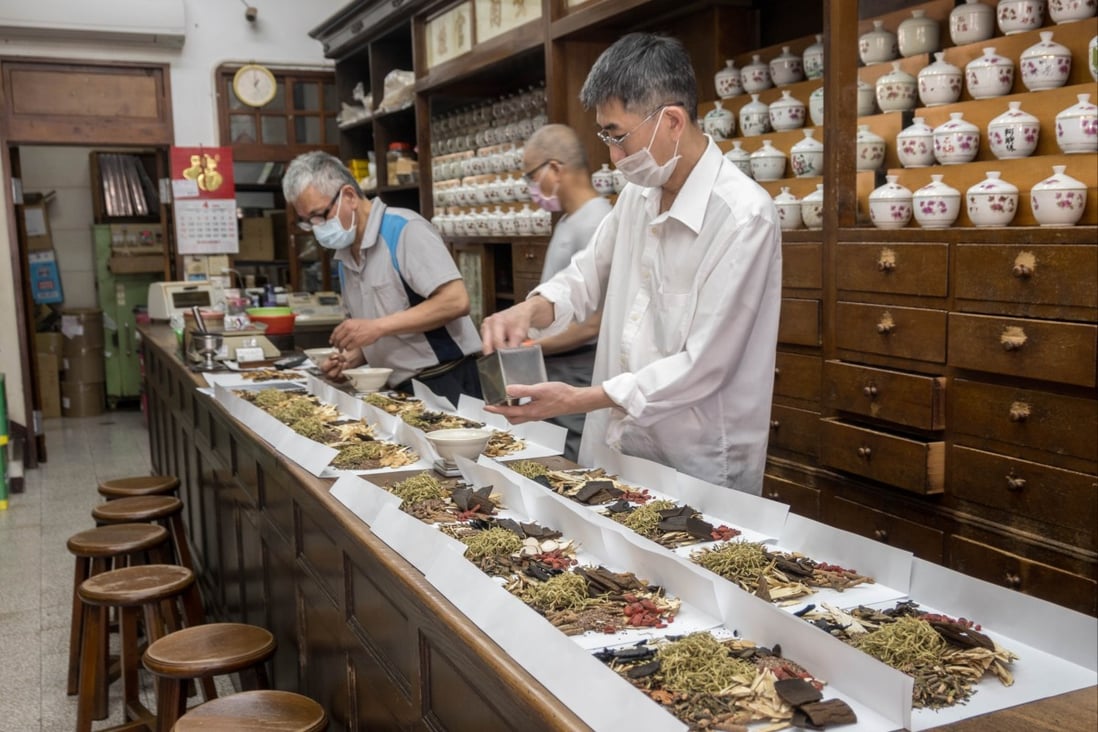
 i_need_contribute
i_need_contribute

Traditional Chinese medicine (TCM) practitioners sort herbal preparations. Astragalus root, used in TCM, has been found to reduce inflammation in heart attack patients in a UK study. Photo: Shutterstock
Traditional Chinese medicine (TCM) derived from the root of the Astragalus herb can significantly reduce inflammation in heart attack patients and boost immunity, according to scientific research.
Researchers at Newcastle University in the UK conducted the study on older patients who were given the plant-based compound for more than a year after suffering heart attacks, alongside a group who were given a placebo.
They found that a compound extracted from Astragalus root known as TA-65 significantly reduced inflammation without negatively affecting their immune systems, unlike current cardiovascular treatments.
The study, published in the journal GeroScience, showed when TA-65 was given to patients for over a year after they suffered a heart attack, it specifically increased lymphocytes – a type of white blood cell that helps the body’s immune system.
In addition, patients treated with the drug experienced far fewer complications and issues, such as chest or joint pain, following their heart attack.
Ioakim Spyridopoulos, professor of cardiology and cardiovascular gerontology at Newcastle University, led the study, working with the heart team at The James Cook University Hospital in the nearby city of Middlesbrough.
“It has become widely recognised that inflammation plays a key role in the formation, progression, and rupture of a coronary plaque, which induces heart attack, but, importantly, it is also a major risk factor for further complications,” Spyridopoulos says.
“Reducing inflammation is, therefore, considered a key treatment target following a heart attack for patients, and our study showed that TA-65 reduced inflammation by up to 62 per cent.”
The study was carried out on 90 patients aged 65 and over. Patients had blood measurements taken at baseline, after six months, and after a year, and were reviewed regularly in the clinic to check for any side effects.
"If we can show TA-65 improves outcomes of patients who have suffered a heart attack, it will become an addition to patients’ medical care"
Ioakim Spyridopoulos, professor of cardiology and cardiovascular gerontology at Newcastle University
“While some potent anti-inflammatory drugs have been shown to improve outcomes after heart attacks, they result in suppression of the immune system and increase the risk of severe infections,” Spyridopoulos says.
“In our study, the widely available drug TA-65 was shown to reduce inflammation but also appears to improve immunity by increasing a patient’s immune cells,” he adds.
Those who received the TA-65 drug had few adverse effects, such as a fever or new medical problem, following their heart attack and showed 30 per cent fewer adverse effects than the group given a placebo.
pyridopoulos says: “If we can show that TA-65 improves the clinical outcomes of patients who have suffered a heart attack, on top of modern treatment options, it will become an important addition to patients’ medical care.”
The research team now hopes to conduct a larger trial focusing on whether TA-65 reduces adverse cardiac events, such as more heart attacks or even death, in such patients.
TCM has been used for thousands of years, but there is limited empirical evidence of its effects. However, it is gaining recognition, with the World Health Organization recently adding TCM therapies to its global diagnostic compendium for the first time.
TCM is believed to have a wide variety of antioxidant components which can be beneficial in treating cardiovascular disease, which mainly develops as a result of oxidative stress.
Previous studies have found that certain TCM compounds appear to have significant anti‐hypertensive effects, and can improve outcomes in coronary heart disease, heart failure and type 2 diabetes. However, the data is inconsistent because of a lack of large‐scale randomised controlled trials.
Claims have also been made that TCM can aid with quitting smoking and even boosting immunity to fight Covid-19.
Astragalus, which is available in liquid, capsule, tablet, intravenous and inhalable forms, is not recommended for pregnant women or those breastfeeding, children, or people with autoimmune disease. The side effects of taking it may include rashes, itching, nausea, diarrhoea and headaches.